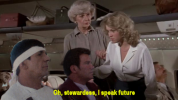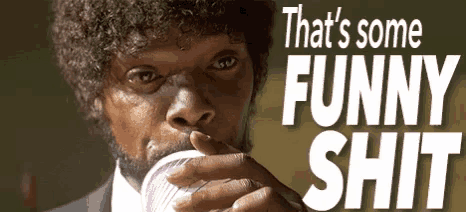Wouldn't a formal speech transend time better than time specific colloquialisms?
-
Welcome! The TrekBBS is the number one place to chat about Star Trek with like-minded fans.
If you are not already a member then please register an account and join in the discussion!
You are using an out of date browser. It may not display this or other websites correctly.
You should upgrade or use an alternative browser.
You should upgrade or use an alternative browser.
Do you speak future?
- Thread starter Laura Cynthia Chambers
- Start date
The short answer is it depends. Extremely formal speech csn sound timeless but also push people away because they don't speak. It sounds unique but ultimately not very resonant.Wouldn't a formal speech transend time better than time specific colloquialisms?
On the other hand too colloquial will present as a sign of the period it was made in. So it might resonate better with a contemporary audience but not date well.
As with many things in life it depends on your balancing formal and colloquial. Pie with a fork, as it were.
I'm lactose intolerant. I know all about Tootie.Oh - this reminds me of Fireball XL-5! They had ONE bit of future slang to make the characters sound cool. "Tootie." As in, Venus forgets to do something and says "Oh, I'm such a tootie!"
Wouldn't a formal speech transend time better than time specific colloquialisms?
Possibly, but it runs the risk of making the characters sound stiff and pompous, which can be off-putting and make the characters harder to identify with.
Plus, honestly, all works -- including SF -- will end up showing their age eventually. The trick is to see that as a feature, not a bug, and enjoy them as time capsules.
I confess I love the old-timey lingo in vintage books, movies, and tv shows -- "Eat dirt, you soap bubble!" -- to the extent that editors have sometimes asked me to tone it down when I'm writing old-fashioned pulp adventure yarns.
"Get your mitts off me, you big palooka!"

Last edited:
Try reading some of Patrick O'Brian's Aubrey/Maturin books. Very 1805ish style of speech in each of them. Pulls you into the period very nicely but, it can be a bit of a problem.The short answer is it depends. Extremely formal speech csn sound timeless but also push people away because they don't speak. It sounds unique but ultimately not very resonant.
On the other hand too colloquial will present as a sign of the period it was made in. So it might resonate better with a contemporary audience but not date well.
As with many things in life it depends on your balancing formal and colloquial. Pie with a fork, as it were.
"Knocked on the head" being used repeatedly instead of "getting killed". "The Dear knows" instead of directly referencing the "Dear Lord" (trying to avoid taking the Lord's name in vain) etc...
I remember Doctor Who comics published in the 1990s did a story set in the near future (which I think was supposed to be 2010 or so) made their attempt at creating future slang, which just came off as bizarre. IE, everyone referred to each other as "child" for no real apparent reason.
I saw something recently talking about, IIRC, a Big Finish character in the wilderness years from the near-future of 2024 who used “sus” as future-slang, managing to hit the nail right on the head.
I saw something recently talking about, IIRC, a Big Finish character in the wilderness years from the near-future of 2024 who used “sus” as future-slang, managing to hit the nail right on the head.
And hasn't "Paradise Towers"' Kang slang of "unalive" for "dead" caught on recently in real life?
Cagney was quite cool back in the '30s and '40s, but who doesn't chuckle today when he exclaims ''a coppah!!!!!''?I confess I love the old-timey lingo in vintage books, movies, and tv shows -- "Eat dirt, you soap bubble!" -- to the extent that editors have sometimes asked me to tone it down when I'm writing old-fashioned pulp adventure yarns.
"Get your mitts off me, you big palooka!"
"The Dear " is actually a transliteration of an Irish expression. It's not an avoidance of the Lord's name.Try reading some of Patrick O'Brian's Aubrey/Maturin books. Very 1805ish style of speech in each of them. Pulls you into the period very nicely but, it can be a bit of a problem.
"Knocked on the head" being used repeatedly instead of "getting killed". "The Dear knows" instead of directly referencing the "Dear Lord" (trying to avoid taking the Lord's name in vain) etc...
"Dhia" pronounced "dear" means "God". Irish uses a direct article when English does not. "The Dear knows" means "God knows". Nothing minced about it - and the expression is still in use.
Please Do Not Feed The Pedant
Writers at TNG could get pretty frustrated with that overly formal, "hit our mark and declaim" (as Sirtis put it) style of writing and performance.
We were told by a script editor that, "You don't write the stilted Star Trek language, damn it." Rather obviously tongue-in-cheek.
I'm glad that's done with. It was a mannered attempt to imitate 1960s TV. Into the dumper.
We were told by a script editor that, "You don't write the stilted Star Trek language, damn it." Rather obviously tongue-in-cheek.
I'm glad that's done with. It was a mannered attempt to imitate 1960s TV. Into the dumper.
AKA everyone speechifies under the spotlights while the other characters look on thoughtfully?
And wait their turn. No overlapping dialogue, please.
Also, people fucking swear.
It can be an effective shorthand, I suppose. for "I'm really stressed out/something's very wrong" if someone who normally never does it, does. I prefer "bit back a curse", "let loose a string of epithets", "swore loudly", and "(insert made-up term here)" to most profanity. Gets the point across without being vulgar.
Also, people fucking swear.
And Dr. Maturin was supposed to be mixed Irish and Catalan so, that fits."The Dear " is actually a transliteration of an Irish expression. It's not an avoidance of the Lord's name.
"Dhia" pronounced "dear" means "God". Irish uses a direct article when English does not. "The Dear knows" means "God knows". Nothing minced about it - and the expression is still in use.
Please Do Not Feed The Pedant
In hindsight, I kinda wish I hadn't used "goddamnit" as a example of timeless slang, since I didn't mean to ignite yet another debate on profanity in media.
Let's just pretend I used "Hold your horses, buddy!" as an example of colloquial dialogue that has aged better than "Groovy, man!"
Let's just pretend I used "Hold your horses, buddy!" as an example of colloquial dialogue that has aged better than "Groovy, man!"

human speech in natural languages tends to stay at 39bps data rate regardless of the energy density each language is capable of holding. Trends will change, but seeing how aux and con languages failed to gain much traction in the last two centuries (volapuk, Esperanto, Interlingua, etc) I don't think much would change, just idioms, slang and the need to differentiate from the other.
Considering the things I've seen, the dribble of twitter threads, this seems like a very accurate picture of the continuing present we live in. Thank you Doctor Who comics for showing us the way, and for making Frobisher.I remember Doctor Who comics published in the 1990s did a story set in the near future (which I think was supposed to be 2010 or so) made their attempt at creating future slang, which just came off as bizarre. IE, everyone referred to each other as "child" for no real apparent reason.
Similar threads
Contest: ENTER
February 2026 Art Challenge - Suggest Your Themes!
- Replies
- 5
- Views
- 674
- Replies
- 0
- Views
- 98
Contest: ENTER
March 2026 Art Challenge - Suggest Your Themes!
- Replies
- 2
- Views
- 250
Contest: ENTER
January 2026 Art Challenge - Suggest Your Themes!
- Replies
- 2
- Views
- 576
- Replies
- 3
- Views
- 314
If you are not already a member then please register an account and join in the discussion!


